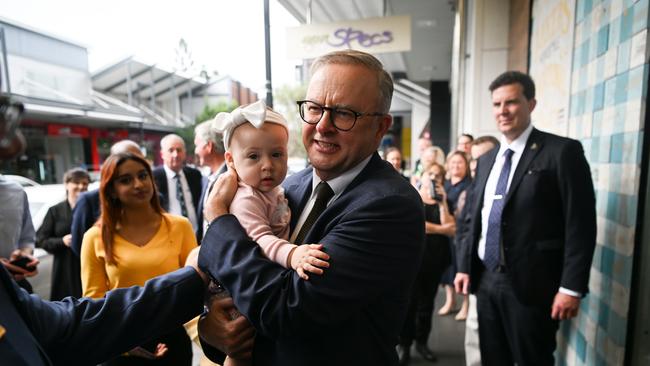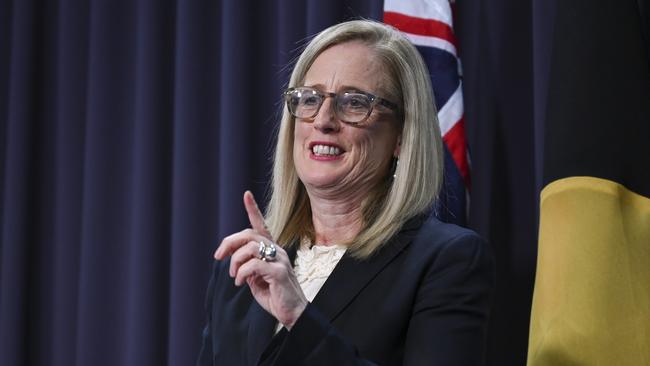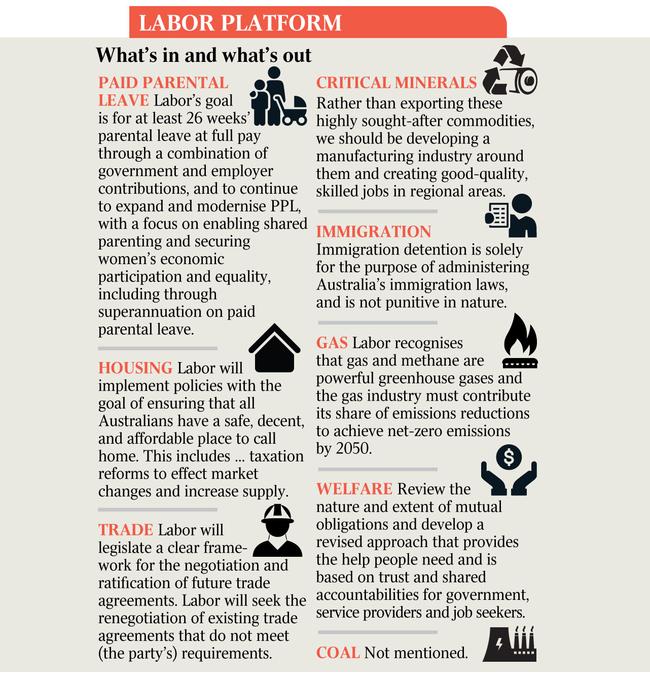Labor backs superannuation on paid-parental leave
The Albanese government has revived a goal to add super to parental leave payments and will pursue tax reform to lower the cost of housing.

Labor has revived its goal to add superannuation to paid parental leave payments and will pursue tax reform to make housing more affordable, according to the final version of the party’s draft policy platform to be debated at next month’s national conference.
An aim to provide superannuation payments on PPL – which was in its pre-election platform in 2021 – has been reinserted after the wording was dumped from earlier draft versions for the 2023 policy document.
The draft platform also declares a goal for paid parental leave of full pay for “at least” 26 weeks, similar to Tony Abbott’s policy ahead of the 2013 election that was bitterly opposed by then prime minister Kevin Rudd and was later blocked by Labor in the Senate under the leadership of Bill Shorten.
Labor’s commitment to increasing the availability of housing has also been bolstered, amid a push from party members and unions to revisit curbing negative gearing.
The Weekend Australian understands Labor women and union officials demanded stronger support for an expansion of paid parental leave entitlements in the draft document, after a preliminary version watered down commitments outlined in the platform Anthony Albanese took to the last election.
“Labor’s goal is for at least 26 weeks’ parental leave at full pay through a combination of government and employer contributions, and to continue to expand and modernise PPL, with a focus on enabling shared parenting and securing women’s economic participation and equality, including through superannuation on paid parental leave,” the draft document says.
An earlier version had a more vague ambition to “expand access to paid parental leave to increase support for parents and promote equal parenting”.
The preliminary draft was also less prescriptive on superannuation for paid parental leave, merely stating a goal to close the gender gap for savings “including lost savings due to parent and carer responsibilities”.
Labor women’s group Emily’s List and a number of unions were preparing to move motions on the floor of the national conference over the matter, prompting the clauses from the 2021 platform to be reinstated.
Ahead of the May budget, Jim Chalmers rejected a push by the government’s Women’s Economic Equality Taskforce calling for the paying of superannuation on PPL. At the time, Women’s Minister Katy Gallagher said the government could not “do it all” in one budget as the government delivered a thin $4.2bn surplus.

But pressure to fund the proposal is set to intensify as the budget surplus is expected to balloon to a record $20bn.
The draft platform was compiled by a group of Labor MPs, party members and unionists known as the national policy forum. The draft will be debated at the national conference in Brisbane in August, with the final version binding federal Labor in the next term of parliament.
The Australian revealed last week Labor has dumped supportive references to coal in its draft policy platform, despite the sector’s $124bn in export revenues helping deliver Australia’s first budget surplus in 15 years.
With Labor set to face pressure at the national conference to revisit clamping down on negative gearing, the draft platform proposes “taxation reforms” to effect market changes and increase supply in the strapped housing market. Government sources said this did not refer to negative gearing changes but related to tax incentives in the May budget for investment in build-to-rent projects.
Along with a new commitment to reduce “regulatory barriers that discourage the superannuation sector from investing in residential housing”, a clause stating safe and secure housing “is a basic human right” was inserted into the platform.

The Weekend Australian understands a motion is likely to be moved at the national conference by Labor for Housing co-convener Julijana Todorovic calling on the party to revisit negative gearing reforms, with the push being supported by some unions.
CFMEU secretary Zach Smith is likely to outline the union’s plans to push for housing policy reform at a speech to the National Press Club in Canberra next week. The draft platform also back-pedalled on the omission of a research and development investment target of 3 per cent, which elicited fury from former Labor MP Kim Carr and others in the research sector.
As Australia struggles to land the EU free trade deal, the platform commits Labor to legislating “a clear framework” for the negotiation and ratification of future trade agreements, raising the potential need for existing agreements to be renegotiated. “This framework will set out the parameters for negotiating mandates for these agreements … as well as promoting transparency through clear consultation and reporting requirements,” a new clause in the draft said. “Labor will seek the renegotiation of existing trade agreements that do not meet these requirements.
“Labor will only enter into trade agreements that maintain the Australian government’s capacity to govern in the interest of all Australians.”






